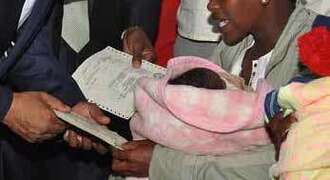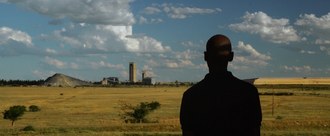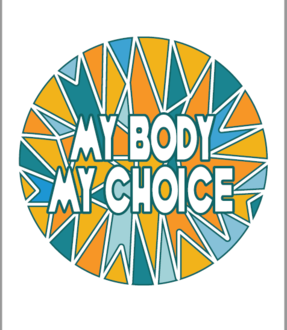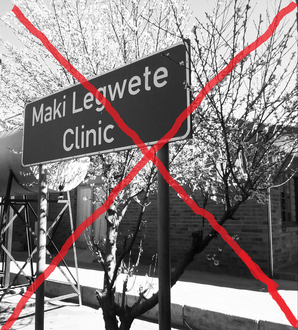- Featured
- Clean air
- Climate justice
- Consumer Rights
- Corporate Accountability
- Data access
- Early Childhood Development
- Economic fairness
- Education
- Electoral fairness
- Environmental justice
- Food justice
- Gender based violence
- Grants/social assistance
- Health
- Housing and infrastructure
- Industry interference
- Land Justice
- LGBTQIA+ rights
- Media/ information access
- Public transport
- Racism
- Reparations
- Safety
- Sanitation
- Service Delivery
- Sexual and Reproductive Rights
- Social justice
- Unemployment
- Womxn's rights/ gender equality
- Workers' rights
- More
-
Tell Heineken to stop abusing labour broker workers in South Africa(For those who are Dutch speakers there is a translation of the below text into Dutch at the end of the English text) A total of 55 workers were recently dismissed from the Heineken brewery in Sedibeng, South Africa. The workers were employed through labour brokers to do jobs such as sorting and packing. Some have been earning less than R4500 per month and they all earn only 20-25% of what their co-workers who are directly employed by Heineken earn. These workers have been working under, what they call ‘slavery conditions’. Gladys Thaane who worked at Heineken brewery in Sedibeng for 9 years before being dismissed says, “They keep us in a state of being unsure and anxious all the time by moving us from labour broker to labour broker. I worked under five different labour brokers while doing the same job of packing and sorting for Heineken. This is their way of keeping us away from decent wages and rights. For us women it is so bad. We suffer from long periods (menstruation), back pains and breast problems but we cannot say anything because we are not sure we’ll have a job the next day. The managers even target us for sexual harassment. Now when we claim our rights they chase us away.“ The workers were accused of participating in an ‘illegal gathering’ and ‘breaking labour laws’ by the labour brokers who employed them. This despite the fact that there is no concept of an ‘illegal gathering’ in South Africa’s laws. The workers took part in a legal protest in their time off against someone other than their official employer which means there was no way they broke labour laws. The workers were part of a group that visited Heineken’s head office in South Africa and tried to meet with the company. These workers were victimized for simply fighting for their basic rights. This hardheaded response of Heineken is consistent with how it reacted to all efforts of the labour broker workers to improve their conditions and claim their rights over the last few years. The company only acknowledged the workers and their struggles when there was public pressure on Heineken to treat its workers fairly. We demand that Heineken immediately rehire these workers with permanent employment and living wages. Bij de Zuid Afrikaanse Heineken brouwerij in Sedibeng zijn onlangs in totaal 55 werknemers onslagen. Zij waren in dienst als uitzendkrachten en verrichtten taken als flessen sorteren en kratten vullen. Sommigen verdienden minder dan 300 euro per maand. Uitzendkrachten verdienen slechts 20% tot 25% van wat werknemers verdienen die direct bij Heineken in dienstverband zijn. "Mijn naam is Gladys Thaane. Ik werk al 9 jaar bij Heineken Sedibeng en het is al 9 jaar een worsteling. We zijn constant bezorgd en onzeker op het werk omdat we van uitzendbureau naar uitzendbureau worden geschoven. Ik heb voor 5 verschillende uitzendbureaus gewerkt terwijl ik dezelfde baan had: flessen sorteren en kratten vullen voor Heineken. Dit is hun manier om ons weg te houden van degelijke betaling en onze rechten. Voor ons vrouwen is de situatie heel slecht. We lijden aan erge menstruatieklachten, rugpijn en borst problemen, maar we kunnen niets zeggen omdat we niet zeker weten of we de volgende dag nog een baan hebben. Vrouwen zijn zelfs het doelwit van sexuele intimidatie door managers. Wanneer we voor onze rechten opkomen, worden we weggejaagd. Maar we gaan niet weg. Help ons alstublieft om gerechtigheid te krijgen door deze petitie te tekenen." De ontslagen werknemers worden door de uitzendbureaus beschuldigd van ‘illegale samenkomst’ en het ‘overtreden van arbeidswetten’. In de Zuid Afrikaanse wet bestaat echter geen concept als ‘illegale samenkomst’. Daarnaast namen de werknemers feitelijk deel aan een legale bijeenkomst, in hun eigen tijd, bij een bedrijf dat officieel niet hun werkgever is. Dit betekend dat de uitzendkrachten niet in een positie waren om arbeidswetten te overtreden. De ontslagen werknemers zijn onderdeel van een groep die het hoofdkantoor van Heineken in Zuid Afrika bezochten in een poging een ontmoeting met het bedrijf te bewerkstelligen. De deur van het Heineken kantoor bleef echter dicht. Deze koppige reactie van Heineken is consistent met eerdere reacties van de multinational in de afgelopen jaren op de pogingen van de uitzendkrachten om hun situatie te verbeteren en hun rechten op te eisen. Slechts wanneer er publieke druk is uitgeoefend heeft het bedrijf gereageerd op de werknemers. Uw handtekening is van groot belang om Heineken te dwingen de, volgens de uitzendkrachten, “slavernij omstandigheden” aan te pakken. Eis dat de onterecht ontslagen uitzendkrachten direct hun baan terugkrijgen, permament bij Heineken in dienst komen en fatsoenlijke lonen betaald krijgen!234 of 300 SignaturesCreated by Khaliel Moses
-
Protect our private info! Implement SA’s privacy law!Every day, ordinary South Africans get calls and messages from private companies that want our money, or political parties that want our votes, or banks that want us to take out loans. But how did they get our information? There is a powerful privacy law called the Protection of Personal Information Act (POPI) which is meant to protect every person’s personal info from being traded, misused or stolen [1]. The POPI Act is meant to be enforced by a new privacy watchdog called the Information Regulator (headed by Adv Pansy Tlakula), which can investigate companies or departments that misuse your personal info. But six years after being signed, this privacy law isn’t fully in force. After years of bureaucratic delays, the Info Regulator is still not operational. The law will not come into full force until the Info Regulator has enough staff and resources to fulfill its watchdog mandate. While these delays continue, millions of South Africans’ personal info have been exposed through ‘data breaches’ by private companies and government agencies [2]. We need the watchdog up and running to investigate and act against companies and departments which misuse our private info. This is especially urgent as South Africa heads to 2019 elections, given the growing risk of personal info being used for electoral interference [3]. We call on the Information Regulator and Parliament, Treasury to act now: get the watchdog fully staffed and operational, and get the POPI law in force! _________________________ [1] Read more: What you need to know about the POPI law, at https://r2k.org.za/popi-guide [2] “Five massive data breaches affecting South Africans,” Fin24, 19 June 2018: https://www.fin24.com/Companies/ICT/five-massive-data-breaches-affecting-south-africans-20180619-2 [3] “How Trump consultants exploited the Facebook data of millions,” 17 March 2018: https://www.nytimes.com/2018/03/17/us/politics/cambridge-analytica-trump-campaign.html Note from R2K: View the Amandla.mobi privacy policy at http://awethu.amandla.mobi/privacy_policy It includes a commitment that your personal information will not be provided to any third parties, including us. All signatories to this petition have the right not to receive further updates about this campaign or any others.467 of 500 SignaturesCreated by Right2Know Campaign

-
Gender Wage Gap: Banyana Banyana must get equal pay!South African women earn 27% less than men [2]. Our country already faces so many gendered social and economical issues and the gender pay gap also contributes to these issues. Our national women’s soccer team Banyana Banyana is just one example of women who work hard, yet they still remain underpaid and underfunded compared to Bafana Bafana (national men’s soccer team). If the argument has been that men work harder than women and “deserve” a higher pay, then without a doubt our women’s team have proven themselves to have worked harder than the men, but the willingness to increase their salaries still remains low. Earning an equal salary should not be about one’s gender, it should be about the fact that people do the same work in the same industry, and therefore should be paid the same. The time is now - SAFA must take action and pay the women what they deserve. References: [1] Jordaan calls for help to boost Banyana salaries amid outcry, Matshelane Mamabolo for IOL, 30 November 2018 [2] Do South African women earn 27% less than men?, Gopolang Makau for Africa Check, 27 September 2017700 of 800 SignaturesCreated by Yolanda Dyantyi
-
Last day to stop Home Affairs xenophobic attack on our African childrenIn the same week Health Minister Motsoaledi blamed our fellow Africans for the state of our health system, Home Affairs have quietly proposed new regulations to the Births and Deaths Registration Act to stop certain children born in Mzansi from receiving a birth certificate. Read the draft regulations here: http://pmg-assets.s3-website-eu-west-1.amazonaws.com/181012draftreg-registrationofbirthsdeaths.pdf Organisations such as Lawyers for Human Rights, Centre for Child Law, the Scalabrini Centre and the UCT Refugee Law Clinic sounded the alarm on Wednesday: http://www.lhr.org.za/news/2018/home-affairs-discontinue-birth-certificates-foreign-children1,365 of 2,000 SignaturesCreated by amandla mobi member

-
Life Esidimeni families still waiting for paymentWhile other Life Esidimeni families have been paid [1], there are still remaining families yet to receive payment. Why split the families? [2]. The Life Esidimeni families share a collective pain, why prioritise payment for others and not all? The remaining families also need closure and the payment is necessary for this. The Premier made a public commitment to honour the payments [3], now his office is giving the remaining families the run around and it's not right, haven't they suffered enough! All the families ask for is a firm commitment of the 10th December 2018 as a previously agreed deadline for everyone to receive payment and for the Premier's office to stop postponing and commit. References [1] https://www.enca.com/south-africa/life-esidimeni-families-have-received-their-payment [2] https://www.sowetanlive.co.za/news/south-africa/2018-10-16-esidimeni-families-have-to--wait-for-payment/ [3]https://www.news24.com/SouthAfrica/News/makhura-vows-life-esidimeni-families-will-get-compensation-before-deadline-2018061152 of 100 SignaturesCreated by Gabo Kgomongwe
-
Gold miners are dying of silicosis and TB while waiting for compensation, demand action!Government institutions tasked with compensating sick miners have become dysfunctional with backlogs of 200 000+ unpaid certified claims and an even larger number of unprocessed claims. Stringent requirements and processing centralised in Johannesburg makes it very difficult for sick and repatriated miners to access compensation. Many are unaware of their rights to compensation and thousands have already died without being compensated. Without serious reform of the compensation system, and a concrete plan of action from the TSHIAMISO TRUST, most of the 500 000 miners will die without receiving anything, unless we make this our business and do something. THE COMPENSATION SYSTEM IS BROKEN and if the R5 billion is not paid out within 12 years, it will remain with the mining companies.1,382 of 2,000 SignaturesCreated by Breathe Films

-
Government must ensure there are Sexual Offences Units at all institutions of higher learningA Sexual Offences Unit will ensure that survivors of gender based violence receive specialised and sensitive support and resources that will help towards their healing journey. Campuses that have an already existing ‘gender office’ need to change their systems so that they serve the concerns of everyone on campus, and are in line with the proposed Sexual Offences Unit. The Black Womxn Caucus, an intersectional women’s organisation at Wits University have called for a ‘rapid response rape team’ for gender based violence to be established on the campus. The movement advocates for a thorough understanding of gender violence as it occurs in many forms and in many spaces, and reinforces the violences that womxn and gender non-comfornimg bodies are subjected to in this country. As the number of rape, sexual abuse and killing of womxn and children in this country continues to increase so does the call from those most affected by violence in our society to organise ourselves to fight gender based violence. The Black Womxn Caucus insists that if their Vice Chancellor at the time, Adam Habib, among others, were able to establish a rapid response team [4] to clamp down on student protest action following the #FeesMustFall movement, there is no reason the university should also prioritise the establishment of a ‘rapid response team’ to address gender violence on campus. The Sexual Offences Units should include: support staff who encourage everyone on campus to go for prosecution through reporting their cases; this includes a 24 hour psychologists available at all times for emergencies, and a space for activists to assist in sharing insights to developing better models aimed at reducing all forms of violence on campus. This unit must also represent the different socio-economic backgrounds of members of the institutions community, and be able to cater to survivors of all backgrounds.152 of 200 SignaturesCreated by Black Womxn Caucus
-
President Ramaphosa, sign the Political Party Funding BillThe Political Party Funding Bill has the potential to curb the instances of corruption that plagues our political and electoral systems. We have seen it with the State Capture Inquiry and through the instances of maladministration in local government structures. All of this because we don't have access to the crucial information of who provides funding to political parties. It is our democratic right to not just vote but to make an informed vote. The information of political parties’ private donor information is required to make an informed vote at the elections. The longer the President delays signing the Bill into law, the longer we will have this democratic right denied. After twenty-four years of South Africa’s democratic dispensation, political parties remain unwilling to provide the public with information on their private funding. For many years, we have been campaigning for Parliament to regulate the transparency of political parties private funding information. Although long overdue, in 2017 Parliament finally drafted the Political Party Funding Bill. This Bill is the only law that will place an obligation on political parties to disclose information on their private funding. Earlier this year the Bill was adopted in Parliament, however the Bill cannot be implemented until President Cyril Ramaphosa signs the Bill into law. Sign this petition and help put measures in place that could effectively prevent more dubious dealings on all levels of government that affects all South Africans.383 of 400 SignaturesCreated by Amandla.mobi Member
-
Publish the Moerane Commission hearing transcriptsIndependent analysts put the number of people killed in what has been dubbed as political killings in KwaZulu-Natal (KZN) as high as 104 [1]. These killings have made residents feel unsafe. Despite this, KZN Premier, Willies Mchunu, refuses to release the Moerane Commission report and hearing transcripts. Even when a Public Access to Information (PAIA) request was made on 16th August, giving him 30 days in which to act, the Premier has failed to comply. Premier Willies Mchunu appointed the Moerane Commission of Inquiry to investigate the underlying causes of the killings and to come up with recommendations based on the evidence from the security forces, victims, families, political parties and local government. The Commission completed its work in May and tabled the Moearane Commission to the Premier. Following that, the report was tabled at the KZN provincial legislature [2], but it still has not been published on all government websites. The public deserves to know. The hearings were funded by the public, the majority of them open to the public, and relates to issues of great importance to the public. The people of Umlazi and surrounding areas, and where the bulk of the killings have a vested interest to know what happened.63 of 100 SignaturesCreated by Right 2 Know

-
Increasing access to safe abortions in South AfricaThe right to sexual and reproductive health (SRH) is an essential component of the right to life, the right to health, the right to education, and the right to equality and non-discrimination. Many women, young women, adolescent girls, and gender non-conforming people in South Africa are vulnerable to ill-health due to several economic and social barriers that prevent them from accessing timely and life-saving SRH services, including safe abortion and contraception. Better access to these services can prevent unsupported pregnancies and reduce unsafe abortions. When a woman is denied unencumbered access to these services, her agency and the right to make decisions about her body are limited. More than two decades have passed since the progressive Choice on Termination of Pregnancy Act (CTOPA), 1996, liberalised abortion in South Africa. However, women in South Africa continue to face barriers in accessing safe abortion services. This is due to severe stigma, refusal by healthcare providers to provide services due to their religious or moral beliefs, lack of information on the legally safeguarded rights under the CTOPA, and poor infrastructure and limited availability of safe abortion services. Due to these barriers, women and adolescent girls often resort to illegal and unsafe abortion services, which put their health and lives at risk. Unchecked advertising of ‘quick and pain free abortions’ by illegal providers perpetuates the stigma and misinformation about abortion among the population. According to a 2009 study, two illegal abortion procedures took place in South Africa for every safe legal procedure. Globally, unsafe abortion is one of the top five causes of maternal mortality, along with post-partum haemorrhage, sepsis, complications from delivery, and hypertensive disorder. In our country, many women die every year, or sustain injuries and disabilities due to unsafe abortions. For example, the 2014 Saving Mothers report, covering the period from 2011 to 2013, reveals that pregnancy-related sepsis accounted for 9.5% of maternal deaths during the said period.332 of 400 SignaturesCreated by My Body My Choice Campaign
-
Poor Services AT Maki Legwete ClinicImagine having to stand in a queue outside the clinic from 6:00am, have the doors open around 7:30am, and only be attended to around 14:00pm. This is the reality of people who live in Kagiso who have been complaining about the poor services at Maki Legwete Clinic. Last week, Tshidi* took her eight month old daughter to the clinic, she became worried when her daughter's temperature spiked up in the middle of the night. Her child also had sore red eyes, she cried continuously and was restless throughout the night. "Akere kea tseba gore di line tsa ko clinic di jwang, so ka kopa ntate wa ngwana wa ka gore a eme ko queue ka bo 6:00am hoseng" Because I know how long the queues are at the clinic, I asked the father of my child to stand in line from 6:00am in the morning." Tshidi* arrived with the child around 7:00am before the clinic opened, and it was already packed, she sat in the queue and was finally assisted around 14:00pm. "Nurse ha ya check-a ngwana sintle, o butsitse feela ka di symptoms, a re fa panado le iliadin" The nurse didn't check my child properly, she only asked about the symptoms and gave us panado syrup and iliadin. Tshidi* left the clinic feeling that she did not receive proper assistance, or that she could ask sensitive health questions she had intended to. Often, young mothers are stigmatized, nurses sometimes give them a bad attitude, and make unwelcoming remarks about the fact that they gave birth at a young age. For 18 year old Tshidi* this is something she experiences frequently, and this makes it difficult and uncomfortable for her to even ask questions about her own health. Two days later , 06 September 2018, Tsidi's daughter's condition had not improved even though she had given her medication as prescribed by the clinic. Tshidi's mother became worried about her granddaughter's condition, she took a day off from work on Thursday, and accompanied Tshidi* to see a doctor for a check up. "Ke kolomaka di ntlu tsa makgowa, ha ke na tjelete, ha Kliniki i sa thusi ngwana sintle, jwale ka Mme o tla kadima tjelete gore o thuse ngwana wa go akere" I clean white people's houses, I have no money, if the clinic doesn't assist, as a mother you'll even borrow money to assist your child." The doctor discovered that the child in question has flue, weak eye-sight, and her eyes are also easily irritable. According to Tshidi, in less than 48 hours of seeing the doctor and using the prescribed medication, she could see an improvement in her daughter's condition. Many woman rely on local clinic services because they cannot afford private health care or medical aid. Unfortunately, Tshidi* is not the only person who has received poor services from the mentioned clinic. For 55 year old Mme Martha* it is having to walk for almost an hour just to get to the clinic, and then having to wait in a long queue that she has a problem with. "Ke tla dira eng, ke domestic worker, ga ke na tjelete ya go ya bona doctor..." What can I do, I am a domestic worker, I don't have money to see a doctor... " A few weeks ago, a number of Economic Freedom Fighters (#EFF) members (mostly residing in and around Kagiso) were gathered outside the clinic in protest. The main road, Geba Street, was blocked, in order to address the issue of poor service delivery. In South Africa, generally, clinics provide poor services. In 2009, a report entitled "Public Inquiry: Access To Health Care Services" was launched by the South African Human Rights Commission (SAHRC). The report mainly focused on (among other issues) complaints regarding poor health services across South Africa. This report was published in 2009, it's 2018 and people are still facing similar issues. Why is that? It is highly advisable that the manager of Maki Legwete Clinic should read the mentioned report, especially the proposed solutions to similar issues faced by the clinic. Earlier this year, the Mitchell's Plain Community members were up in arms about poor services from the Mitchell's Plain Community Health Center. In an article by Kaylynn Palm: https://www.google.co.za/amp/amp.ewn.co.za/2018/01/05/wc-clinic-slammed-for-poor-service-delivery several similarities can be drawn between issues of poor service delivery faced by the Mitchell's Plain community, as well as the Kagiso community. In 2015 two children died outside Lenasia South Clinic due to poor clinic services: https://www.google.co.za/amp/amp.ewn.co.za/2015/02/16/Another-child-dies-after-being-denied-clinic-access. The stories regarding poor health services in South Africa are endless... Maki Legwete Clinic must be reminded of Section 27 of The Constitution of South Africa, which stipulates that: Everyone has the right to "access health care services, including reproductive health services." Access to the clinic is a basic and fundamental right. People deserve to be treated with respect, regardless of their age. For better services from Maki Legwete Clinic, sign the petition below. #PoorClinicServices #MakiLegweteClinic *Not their real names SOURCES: https://www.google.co.za/amp/amp.ewn.co.za/2018/01/05/wc-clinic-slammed-for-poor-service-delivery http://www.ngopulse.org/article/sa-healthcare-system-failing https://www.google.co.za/amp/amp.ewn.co.za/2015/02/16/Another-child-dies-after-being-denied-clinic-access185 of 200 SignaturesCreated by Charlene Mihi
-
We demand a Sexual Offences Unit at Rhodes University!Two years ago, with what sparked an international conversation on the issue of rape and rape culture, commonly known as the #RUReferenceList protests, women and non-binary individuals set precedent for other institutions across the country to participate in a national discussion on problematizing how unsafe campuses are. In 2016 women, from all walks of life across the country demonstrated in solidarity with those at Rhodes University – highlighting not only the prevalence of GBV in our society, but also the failure of institutions in protecting its students. Since the advent of democracy, our institutions pride themselves in being leaders of transformation in society. They have prided themselves in being vehicles providing a vast range of knowledge to individuals entering their spaces. Yet, when it comes to issues of gendered discrimination and the effects it has on individuals – particularly women and minority groups – our cries seem to be invalid, and our experiences erased. We are tired of saying “enough is enough!” when it only suits the institution’s agenda. Your ‘enough’ does not suffice as every day we continue to live in fear of when our bodies will become another statistic to the vast crimes we experience on a daily basis. A Sexual Offences Unit will ensure that survivors of gendered and sexual orientation violence are met with the utmost sensitivity, specialized support and resources that will help towards their healing processes. The Sexual Offences Unit should include: support staff who encourage students to go for prosecution through reporting their cases; this consists of 24 hour psychologists available at all times of emergencies, and a space for student activists to assist in sharing insights to developing better models aimed at reducing all forms of violence on campus. This unit needs to be cognizant of all socio-economic demographics of the student body, and thus be able to cater to survivors of all backgrounds. The unit will provide sensitized support to student survivors who might not want to go through reporting their cases at the SAPS where they face further victimization due to a lack of training, resources and subsequently compassion. Rhodes University needs to cultivate a space that will ensure a prioritization of justice to survivors of sexual violence. In conjunction to this, the unit will have to implement the recommendations that were presented by the Sexual Violence Task Team at the end of 2016 in response to the demands of the student led protest #RUReferenceList. This unit will be very important as students leave college and university environments to enter the working space where issues of harassment are also prone. Socialization plays a huge part in curbing violence in our country, and it should start at home, in this case, at school. Rhodes University, much like society at large, needs to tackle gendered discrimination systemically through acknowledging and institutionalizing a culture of accountability in relation to the violence students experience. We need to push for our spaces of higher learning, the communities that we occupy every day, to internalize on a personal level policies and practices that speak to dismantling this culture of protecting perpetrators and stigmatizing survivors.841 of 1,000 SignaturesCreated by Yolanda Dyantyi
.png)

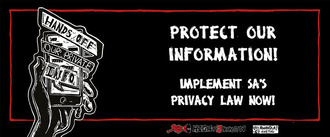
.png)
